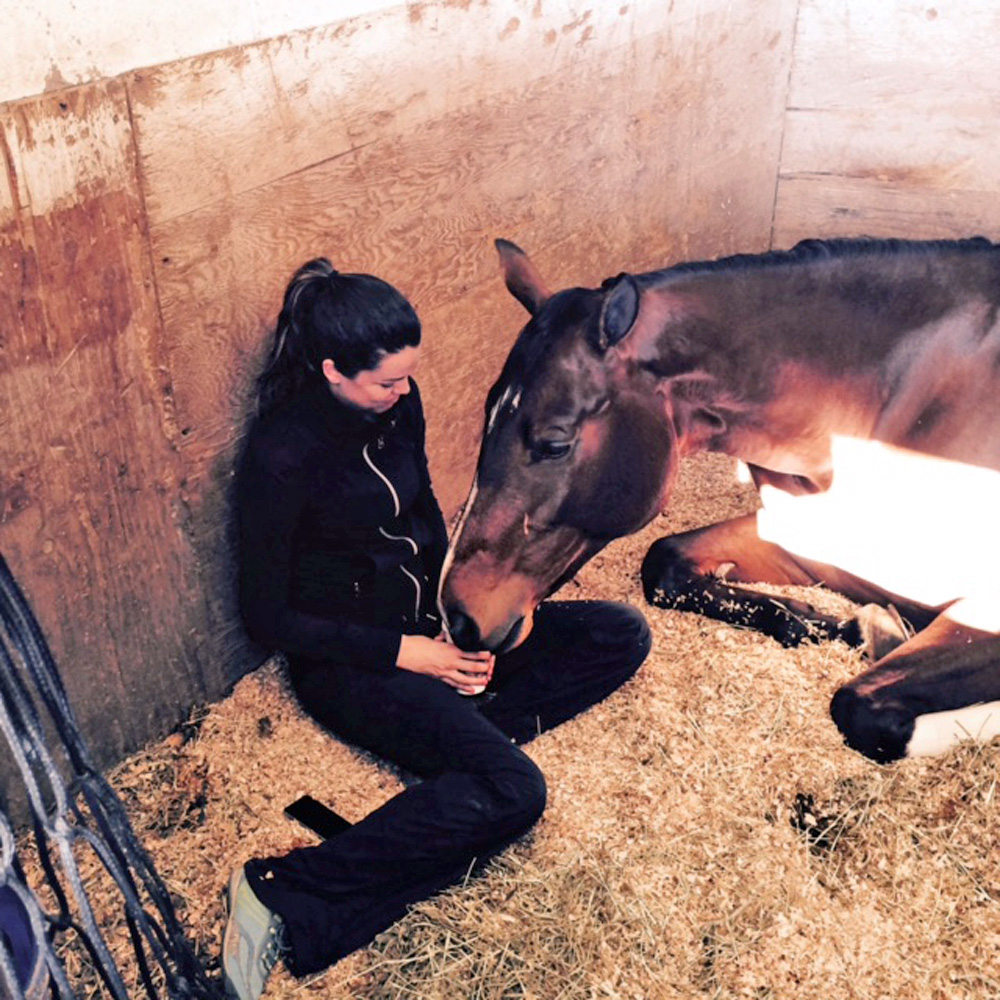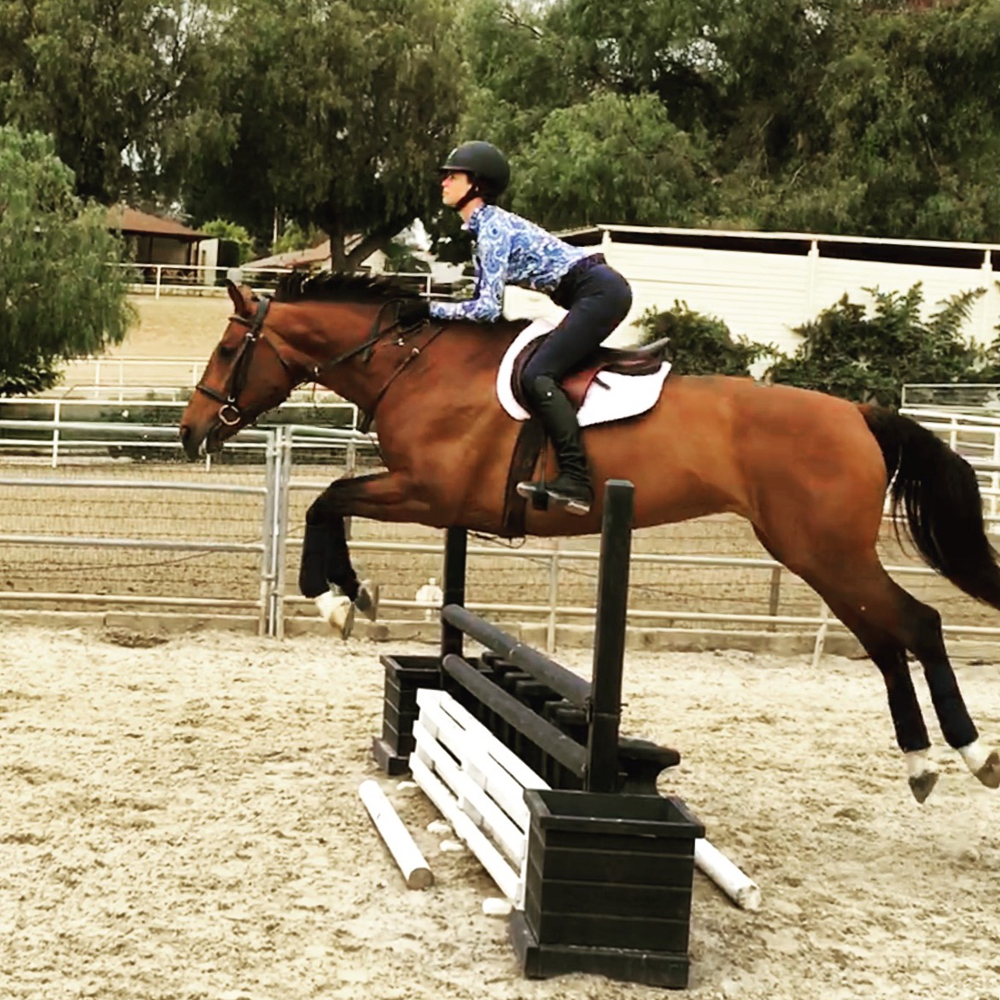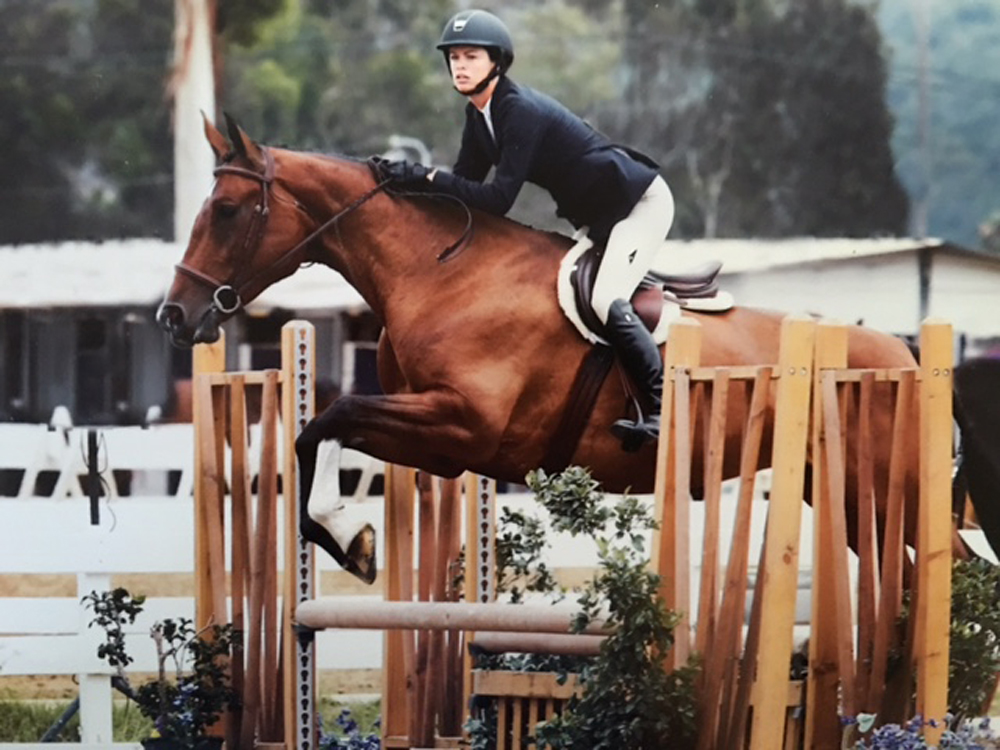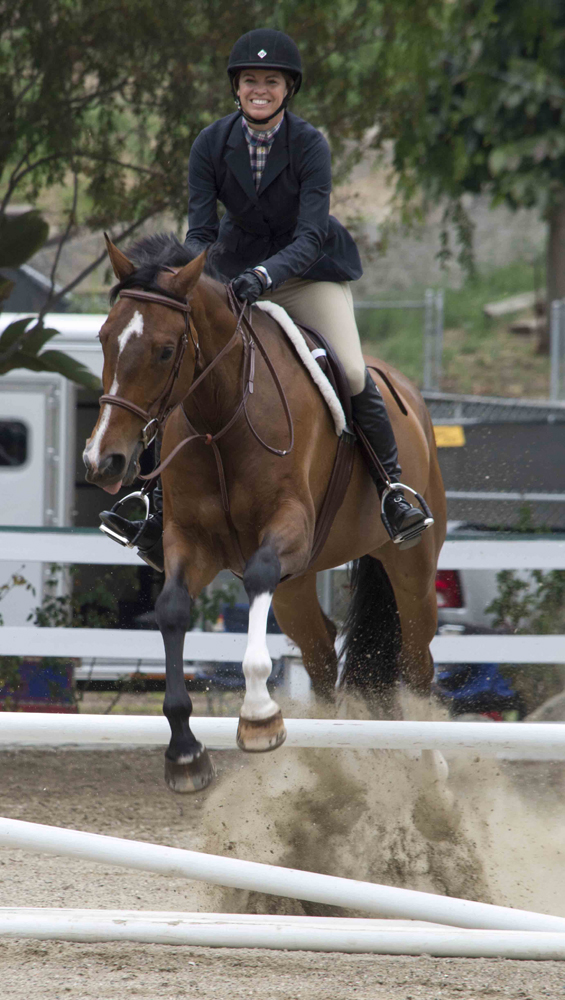There are lots of sayings about green horses and green riders. My favorite, because of its sheer simplicity, is “green plus green equals black and blue.”
Without a doubt, I am a green rider. I grew up riding western, and, after a very long break, bought an english saddle and took up jumping about two years ago. Shortly thereafter, I purchased a green horse.
If I could go back in time, what would I tell myself? Based on my goals, laid out succinctly in my author bio below, I would say: Run. Do not pass go, do not collect $200.
Green is not your answer. You want to find a distance? Get a schoolmaster. You want a pretty ribbon? Get a horse who has earned them before. You want to conquer your show anxiety? You sure aren’t going to do it with a horse who is at her first ever competition.
In retrospect it seems obvious.
But it came down to my requirements and my budget. I am very tall so I was looking a tall, big-bodied horse. I have anxious tendencies so I was looking for a quiet, level-headed horse. I have three-ring ambitions so I didn’t want a dead slow hunter or a hot-blooded jumper. At the time I was horse shopping, I was roughly at cross-rail level, but I needed a horse that would carry me at least through the 3’6″. Or so I thought.
When you add it all together, I was looking for a big, tall, quiet, sweet, sane horse that could do the 3’6″hunters, 1.10-meter jumpers, and throw in some adult medal finals just for good measure. And I live in Southern California, arguably one of the worst buyer’s markets in the world. The unicorn of a horse I was looking for, if I could even find him, would have easily been six figures.
And six figures was not in the cards. Not even close. I had fancy warmblood tastes and a Shetland pony budget.
Something had to give. Like many amateur horse shoppers who have gone before me, I started thinking green. My main objective was to check off as many boxes as possible on my wish list. And I could do that, within budget, with a green horse. It still took some searching, but I found her, and she met most all of my requirements: big, tall, quiet, sweet, sane. Plus three white socks, a star, a stripe, and a snip!

Spending some quality time with Aria.
ADVERTISEMENT
Sure, she had never competed, had barely started jumping, and didn’t know much about, well, anything… but she was chock full of potential to become a perfect show horse. So, with only a rudimentary, abstract understanding of what a horse’s experience brings to the table, I bought an inexperienced 6-year-old who I named Aria.
We were green and greener, but I won the lottery on the black and blue part. Sometimes I’d like to think that I’m gifted at horse selection and that I somehow knew that Aria was a good girl; after all, she was quiet and laidback during the roughly 45 minutes I spent trying her out. But if I’m being honest, it was a stroke of pure dumb luck. It’s two years later and she has never offered to buck, rear, or bolt.
Her idea of a major spook is a one-to-two-foot scoot sideways; her best effort at rebellion is a vigorous head shake. Knock on wood, I’ve never been hurt on her.

Every blue moon we get it together!
No blood and no bruises, and for that I am both extremely grateful and incredibly lucky. But there has been sweat, and there have been tears, and the story isn’t over yet.
Sweat is to be expected in this sport no matter what, but it’s HARD to be an amateur on a green horse. It’s hard to find a distance when you don’t know how to do it to begin with, and your green horse hasn’t quite learned to go straight or to maintain a consistent stride. It’s hard to get a lead change when your horse doesn’t really know what you’re asking for and doesn’t understand why we can’t just counter-canter around the corner, or better yet, stick to our favorite lead around the whole course. (“You said you wanted consistency, right mom?”)
The sweat I can handle. What I wasn’t expecting was the worry, the anxiety, and the self-induced pressure to ensure that Aria reaches her potential.
We were a few months into our journey together. The first trainer we had proved to be not the best fit and I was searching for a new one when it dawned on me. It actually wasn’t about me anymore. While I have my own goals and dreams, my desire for ribbons and bragging rights is simply less important than making sure Aria is educated and employable.
My husband loves to chide me for spoiling my Great Danes, who are bona fide “momma’s boys.” My rebuttal is always the same: the dogs will never have to grow up, move out, get a job, attract a nice girl, support themselves. It is perfectly acceptable for them to be mommy’s little special babies for their entire lives.
Horses are different. They live 25 years, and they are working animals. Many of us also consider them our pets, but they do not command high prices based on their snuggling ability or the velvety-ness of their muzzles. Whether we like it or not, their value is based on the job they can do.
ADVERTISEMENT
It occurred to me early that first year that it’s my duty to make sure that she is qualified for a job. And I was not expecting the weight of that responsibility to feel so heavily, and to lead to constant deliberations over whether I’m doing the right things for her and constant re-weighing the balance between not progressing enough and pushing too hard.

When we get it right. Photo by Captured Moment Photography
I didn’t know I would feel guilty every time I missed a distance or miscommunicated a cue. I wasn’t expecting to feel like the world’s worst human that time I lost my cool and yelled at her in frustration during a particularly rough lesson.
Maybe in a perfect world, green horses would stay with qualified professional trainers until they were 100 percent experienced, safe, sane, patient, forgiving, and ready to teach us amateurs everything we need to know. They would be seeing-eye dogs to the fences and they would bail us out of every tough spot we found ourselves in.
But it’s not a perfect world, and there are no rules against a green rider buying a green horse. Aria hasn’t taught me what a schoolmaster would have. Not once has she packed me around a course or covered up my riding flaws and inconsistencies. Had I bought an experienced horse first, I would likely be showing at a higher level than I am now.
It hasn’t been the smoothest journey for us. We’ve had to switch trainers and facilities several times, and we’ve backtracked a lot more than we should have. But every day Aria greets me with enthusiasm. She has never held a grudge or been impatient with me, even when I deserved it. She has taught me about kindness and forgiveness, and that being a good teammate is more important than any ribbon.

Check out the smile!
The green-green combination is not for the faint of heart, and it’s certainly not the fastest way onto the champion’s podium.
I can’t wait for the day I can announce that Aria is “finished,” seasoned, experienced. But deep down, I suspect that shortly thereafter another greenie may just catch my eye, and the cycles of teaching and learning and of expectations and reality will start again.
Lindsey Long lives in Southern California with her one tabby cat, two Great Danes, two hunter-jumpers, and a husband. She recently returned to riding after a 15-year hiatus and is desperately trying to make up for lost time while balancing a full-time job rife with deadlines. Her goals include winning pretty ribbons, finding appropriate distances with some degree of consistency, and not losing her breakfast at the mere thought of a hunter derby course. Read all of Lindsey’s blogs.















